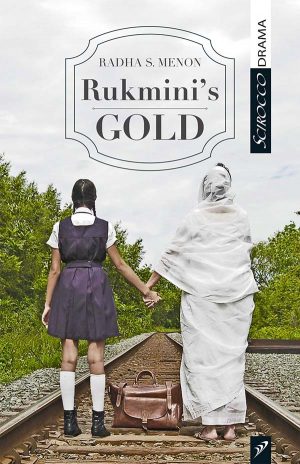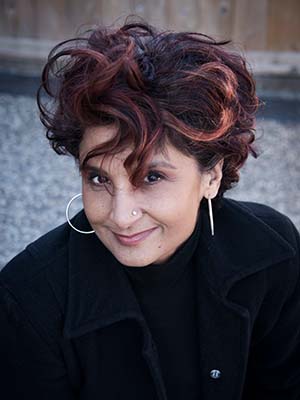Posted May 17, 2022
The Interview – Radha S. Menon
Radha S. Menon
Recipient of the City of Hamilton’s 2020 Arts Innovation Award and the 2016 Theatre Award, animal fanatic Radha S. Menon began performing in British theatre and television in her youth. Stateless until age seventeen, Menon emigrated to Regina, Saskatchewan in 1995 where her performance career abruptly ended, and her writing career began. Her plays, which have been produced at theatre festivals in Canada, the U.S., U.K. and India, include Blackberry, Sita’s Revenge, Ganga’s Ganja, Rukmini’s Gold, Rise of the Prickly Pear, The Circus, and The Washing Machine. In addition, Menon is a filmmaker and production designer for art house films, including Nayan & The Evil Eye, (Design Award, Here Be Dragons Int. Film Festival 2015). Menon is tickled pink to be a finalist for the Cayle Chernin Media Award for a magic realism short film, The Sail Tree, currently in post-production. Radha is currently developing a Devi Triptych and writing her first novel, Death Cry of a Peacock. Menon holds an MFA in Creative Writing from the University of Guelph. She is based in Hamilton.
Radha, you’ve worked as a theatre artist on at least three continents. How did you first become interested in the theatre?
I stumbled into theatre—literally—I was eight and charged with moving a folding chair onto the stage for another performer, but I got stuck with the chair in the doorway; laughter erupted from the audience of parents and I was hooked! I spent as much time onstage as I could after that.
When I was a teenager, I wrote my first play for the Rotary Club All-India School Contest, which took place over ten days in Delhi. My play won an award and although there is no copy of this old text, when I was visiting Bangalore some years back, an old school friend who starred in the show began quoting poetry from my play back to me! I had forgotten that I had ever written it.
Rukmini’s Gold was part of our 2021 Scirocco Drama lineup. The play won the Hamilton Fringe Critics Choice Award, the Sanhita Manch Playwriting Contest in India, as well as the Sultan Padamsee Playwriting Award at Tata Literature Live!, India’s largest literary festival. Tell us more about the play and its themes, and why you think it has been so enthusiastically embraced by both critics and audiences.
Rukmini’s Gold strikes a chord with many people. It evokes a deep sense of longing for home, but what is home? We lose something of ourselves in terms of identity whenever we leave the land of our ancestry, just as we gain other parts in new horizons.
The play follows a family’s journey from India to Africa, the UK and on to North America, which many South Asians have done. We are children of colonization, we were colonized, and we became colonizers.
The play also stems from a deeply feminist perspective through the rarely witnessed lens of multiple women of Indian origins. With an unforgiving gaze, we experience their particular trials within a patriarchal culture steeped in an abhorrent gender bias.
Ironically, this is down to colonization. Traditionally, marriage dowries in India were paid to the bride’s family. The British changed this to reflect the European mode that became mandatory under their rule. In order to marry off your daughter you had to pay a dowry to the groom’s family. Unborn girls become millstones around their fathers’ necks. The avoidance of crippling dowry debt (now $100,000+) has led to a skew in the sex ratio, with 12 million missing girls due to selective abortion and female infanticide.
Your play Blackberry is being produced this summer. Tell us where and when the show will be happening, and give us a sneak preview of the characters.
I would love to!
Blackberry is a site-specific play directed by Alison Wong and featuring Gisy Mohamed, Jason Chung, Molly Mutch, and Rylan Campbell. The play premieres at Carter Park in Hamilton, August 5th–20th. Tickets will be available from July on the Red Betty Theatre website: www.redbettytheatre.org
Here’s the synopsis: Up against racism, police brutality, violence against women, homophobia and an ominous predator, three teens struggle to find a safe place to call their own. When you have nothing to lose, you can be very dangerous.
I am very excited about Blackberry, especially since it was supposed to open in Ottawa at GCTC, but was a COVID casualty like so many other great productions. It was my big break that never happened!
Blackberry is a very personal play, although the characters and plot are fictional; the sentiment and experience stem from painful reality. My friends, two British Pakistani lads, and I spent an entire summer roaming the overgrown and unloved backwater canals of Birmingham (UK) when we were sixteen. These were troubling times, not simply due to overactive hormones and over-blown feelings of adulthood but as ‘Black’ British youth, we were disenfranchised with little access to most resources, including education, we didn’t fit into British society; we weren’t accepted, and racist attacks were common.
At this time, I faced one of my toughest challenges while struggling to cope with my mother’s terminal illness, my father’s absence and my own tenuous place in the world. After a spate of violent attacks, I was filled with terror and rage, compounded by social, economic and political exclusion and continual police harassment; I began to feel hatred poisoning my bone marrow.
I came close to being as bad as my attackers who hated me because of the color of my skin; I wanted to lash out, make others feel the pain, helplessness and fear I experienced on a daily basis. Inevitably, due to powerlessness, my rage was directed internally, manifesting in acts of self-destruction.
That’s when the arts called and forced a re-evaluation of my position, while providing an outlet. I was always drawn to the arts; I began writing songs and got an agent. Being exposed to other parts of society and escaping a segregated population showed me that all people aren’t alike, and I began channeling destructive energy into creation. The arts saved me, time after time: whenever life has floored me. I am forever grateful.
You are the founder and artistic director of Red Betty Theatre in Hamilton, which has been presenting stories from Black, Indigenous and racialized women for more than a decade now. Can you tell us a little about Red Betty?
My writing practice began in the 90s when I was a struggling young actor in the UK, finding the few roles available for women like me, stereotypical and weak. That’s when I began writing dynamic and complex roles for brown women that are more representative, but found that there was nowhere to develop or share these stories in Canada. Rukmini’s Gold was developed in London (UK) with Kali Theatre.
I struggled for years in Canada, but Eurocentric expectations of what theatre is and can be were pervasive in the theatre industry. After much crippling doubt, I finally realised that there was nothing wrong with the work, there was just no room at the table; so I built my own. What began as a way to support my own voice and practice has grown into a not-for-profit that supports other BIPOC writers. I was so excited when the folder with plays from this year’s Decolonise Your Ears New Play Festival dropped into my inbox. This is the second year that RBT is supporting new BIPOC women’s voices by professionally developing their plays with professional BIPOC dramaturgs, actors and directors.
And yes, we accept donations, no, we encourage them! 🙂
Here’s a link to last year’s festival highlights.
Radha, you’re a self-described “animal fanatic.” Can you give us a glimpse of what that means to your life?
Animals have always intrigued me; the light behind their eyes speaks volumes and their instinctive emotional intelligence is apparent as they can readily read what kind of day you’ve had. Most people have forgotten that we humans are animals too. Language can negate this, but it’s a simple fact.
My fascination began at a young age. When I was five, my ornithologist and photographer father took me into the field to catch birds. He would weigh them, measure their wingspan, take notes, and then put a tiny ring on one leg before releasing them. I used to beg him to let me help. I remember cradling small birds in my hands, feeling their hearts beating until I opened my hands and watched with wonder as they flew away.
When people ask my pronouns, I sometimes say she, her, it, and I’m not being facetious. I feel more connected with non-human animals and they have always sought me out. I began rescuing cats aged 7; animals come to me maybe because I see them and feel their sentience and of course I don’t eat them. I have written two plays about animals: Monkey Man and The Sheep, my MFA thesis play, neither have been produced (as yet).
-
 Rukmini’s Gold$15.95
Rukmini’s Gold$15.95

